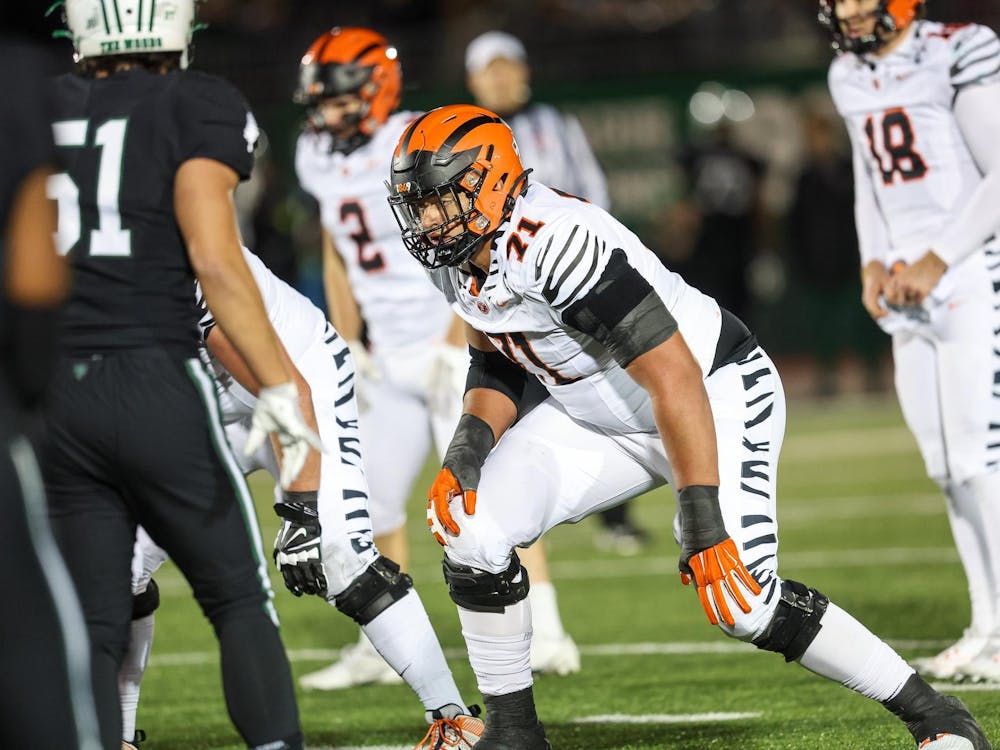The decision has sparked debate over wrestling’s merits in both the domestic and international communities, a discussion that hits home for Princeton’s wrestling team. The team has nearly disbanded twice in recent memory and is still recovering.
In 1993, in the wake of financial and administrative pressure from Title IX, which mandates that college athletic programs comply with federal gender-equality laws and provide equal athletic opportunities for students of both genders, the University announced that it would discontinue the wrestling program.
The team, buoyed by a strong outpouring of alumni support, managed to raise $3 million — just barely enough to help them stay afloat.
Hampered by second-rate facilities — the wrestling room in Jadwin Gymnasium was turned into a weight room, leaving the team to practice in Dillon Gymnasium — and a tarnished image, the team struggled to practice and recruit effectively. The Tigers were relegated to mediocrity for years.
With the team at the lowest point in its history, a ray of light appeared in the form of inflammatory feminist Camille Paglia, who attended a Whig-Clio debate at the University to argue for a resolution: “Wrestling is good for Princeton University.” She claimed that the demise of the wrestling program as a result of Title IX was “a classic case of feminism gone amok.”
In a 1996 interview with the Prince, she said, “wrestling is one of the most ancient sports in the world. It’s part of the Greco-Roman tradition. Title IX was not intended to destroy men’s traditions … In no place should it be allowed to infringe upon men’s rights.”
The debate caught the eye of the national media, and the University was criticized for its handling of the issue. Princeton ended its crusade against the team, but that did not signal the end of the Tigers’ struggles on the mat.
The team retained varsity status, but for years it was little more than a glorified club squad. When head coach Chris Ayres took over the program in the spring of 2006, he inherited a team that was short on talent and stuck in neutral.
“A lot of kids were just walk-ons who just happened to wrestle,” Ayres said.
Although the Tigers wrestled against lower levels of competition, often squaring off against Division II and III schools, they failed to win a single meet during Ayres’ first two seasons as coach, again threatening the status of Princeton’s program.
Despite this lack of competitive success — Princeton lost 187 of its first 198 individual matches under Ayres — he was able to initiate a change in the team’s culture. He credited the wrestlers who were there when he arrived.
“Those guys were the pioneers,” he said. “Their footsteps are all over this program.”

Additionally, and perhaps more importantly, he was able to start convincing recruits that he was capable of righting the ship and restoring success to a once-proud program.
Ayres said that the possibility of individual success in wrestling despite being on a poor team may have helped attract recruits, but eventually young wrestlers were drawn in by the team’s spirit.
“I think it was an individualistic approach in the beginning, but it’s kind of funny — it shifted,” he said. “I think I learned that from the team, actually.”
Ayres certainly fit the bill for a big-time coach. As an undergraduate wrestler at national powerhouse Lehigh, he walked on and set a school record with 120 career victories. He won an Eastern Intercollegiate Wrestling Association title as a junior, recorded a sixth-place finish at the NCAA tournament in his senior year and was named an All-American.
In addition to his personal success, Ayres was integral to the recruitment and training of five Lehigh classes during his time as an assistant there from 2001-2006.
Though unaccustomed to Princeton’s failures on the mat, Ayres continued to stress work ethic and brought positivity to a team that was desperate for a gasp of fresh air.
Eventually, the results followed. In 2008-09, Princeton won two matches, followed by nine the next season. This included a streak of five straight wins and a third place finish in the Ivy League.
Ayres has trained some of the most decorated athletes in school history during the past few seasons. Senior Garrett Frey, who is currently injured, is one of only seven wrestlers in Princeton history to qualify for three NCAA tournaments. He has reached consecutive EIWA finals in the past two years.
Injuries have hampered the Tigers this year and forced young wrestlers onto the mat. They are showing steady improvement, but it is undeniably a down year, as they have only two wins. No matter how the season goes, however, the team has come a long way from its low point in the 1990s and early 2000s.







